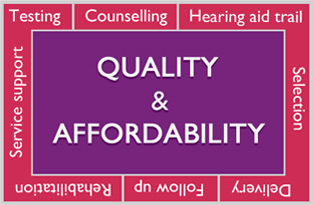Swaram Services
Providing superior customer service is our forte. Be it a change in the programming of your hearing aid, cleaning, adjustment or even periodic servicing, we at Swaram are fully equipped and ready to serve every need of yours. Combining our experience and pursuit of the highest quality standards, we ensure that you receive only the best of what technology has to offer.
Swaram Hearing Aid Centre was the first in Cochin to introduce multichannel fully digital hearing aids of different styles, the smallest being the Oto-Lens IIC(Invisible-In-The-Canal) digital fully programmable hearing aid.
Benefits at Swaram
- Hearing aid trials with suitable hearing aids.
- Ear moulds free of cost with behind the ear hearing aids.
- 15 days free trial period with cash refund policy in case of return of hearing aid.
Quality and Affordability

We provide quality repair service at affordable prices. The manufacturers and labs we deal with help us to have the hearing aid repaired in a timely manner.
Hearing Assessment: Swaram Hearing Aid Centre is equipped with state-of-the-art facilities like Pure tone audiometry, Impedance Audiometry, Special tests, Speech tests, Pediatric assessment with OAE, BERA, ASSR to carry out a variety of hearing assessment tests.
Speech and Language Therapy: Our team of speech and language therapists is certified by the Rehabilitation Council of India. Our facilities include individual speech therapy rooms, with modern therapy kits and hand books for assessment, diagnosis and management of all speech and language disorders like autism, mental retardation, cerebral palsy, stuttering, misarticulating, aphasia, and dysathria.
Pure Tone Audiometry (PTA)
Pure Tone Audiometry (PTA) is a subjective, behavioural measurement of hearing threshold, as it relies on patient's response to pure tone stimuli. PTA is used for the determination of the degree, type and configuration of a hearing loss. This information is critical to determine if medical or surgical intervention is necessary or if hearing aids may help. PTA is used on adults and children old enough to cooperate with the test procedure.
Special Tests :
- SISI (SHORT INCREMENT SENSITIVITY INDEX)
- TDT (TONE DECAY)
Speech Audiometry
Speech audiometry employs speech signals and is used to examine the processing ability and to diagnose the disorders of the middle ear, cochlea, auditory nerve, brain stem pathway, and auditory centres of the cortex. speech audiometry is used to quantify the patient's ability to understand everyday communication.
- SRT (SPEECH RECEPTION THRESHOLD)
- SDS (SPEECH DISCRIMINATION SCORE)
Free field audiometry
Free field audiometry is a behavioral audiometric test done in a sound-treated room. Through two calibrated loudspeakers sounds are presented to a patient (mostly children seated on a parent's lap or in a chair). The purpose of free field audiometry is to establish the hearing sensitivity at various frequencies. Free field audiometry is also used for testing with hearing aids.
Tympanometry and Reflexometry
Tympanometry is an examination used to test the condition of the middle ear and mobility of the eardrum (tympanic membrane) and the conduction bones by creating variations of air pressure in the ear canal. This information is used in the diagnosis of middle ear disease. Acoustic reflexes are measured in order to determine whether the middle ear muscles are properly reacting to loud sounds. This test can also be used to assist in testing of hearing in young children and/or to identify other otologic problems.
OAE test (Otoacoustic emission)
The OAE test works on the principle that a healthy cochlea (inner ear) will produce a faint echo when stimulated with sound. A small ear-piece, containing a speaker and a microphone, is placed in the baby's ear. A clicking sound is played and if the cochlea is functioning properly the ear-piece will pick up the echo. This is recorded on a computer that tells the screener if the baby needs to be referred for a further screening test. If the test records strong responses from the baby's ear then they will not need any further tests.
The screening test is very quick and gives the result immediately. Being referred for a further screening test doesn't necessarily mean that the baby has a hearing loss. It can be difficult to get a response if the baby is unsettled at the time of the test, if the room is noisy or if there is any fluid in the ear from the birth process. The test is usually repeated before referral for the second type of screening test.
Brainstem Evoked Response Auditory (BERA)
Brainstem Evoked Response Auditory (BERA), is an objective procedure used to measure the function of the brainstem in response to sound. The results can provide general information regarding hearing sensitivity. This test can also be used for neuro-diagnostic purposes, to determine if the brainstem is transmitting sound properly. A series of clicks or tones are presented to the patient while she/he rests or sleeps. Electrodes are placed on the head to detect the response of the brainstem to the sounds; the electrodes do not cause any pain or discomfort.
Auditory Steady State Response (ASSR)
Auditory Steady State Response is the latest technology for hearing assessment of an infant as old as 7 days. Results are in the form of automated audiograms generated by the special software.
